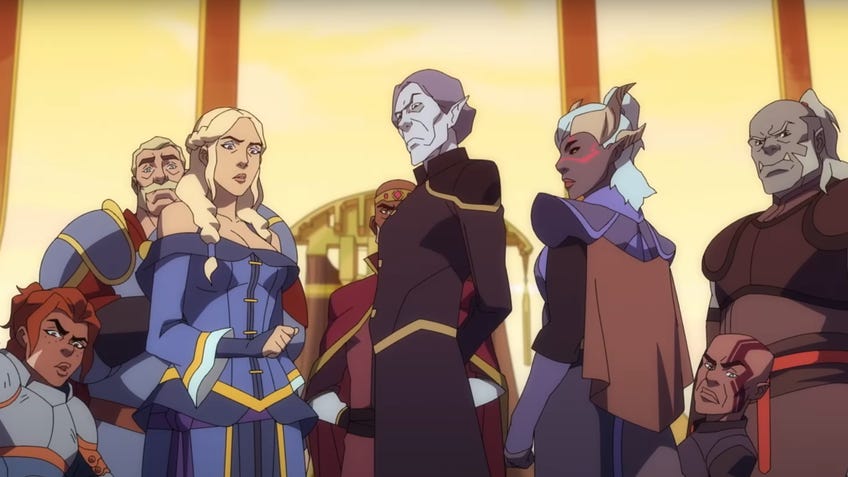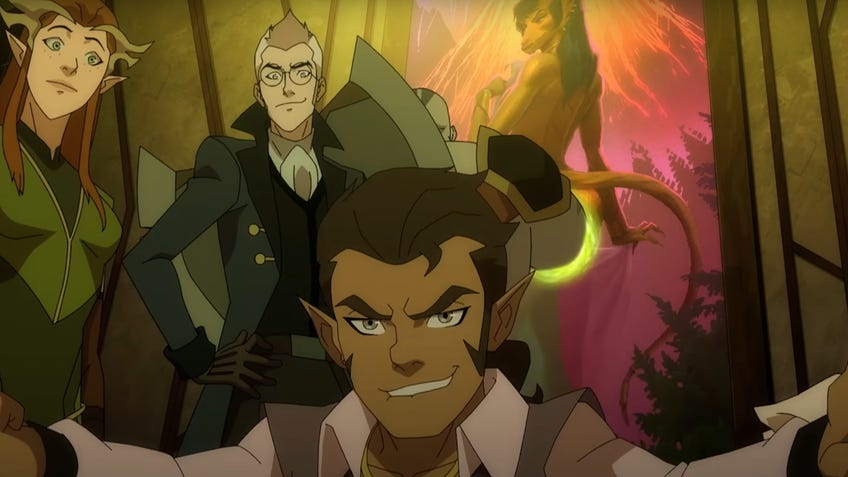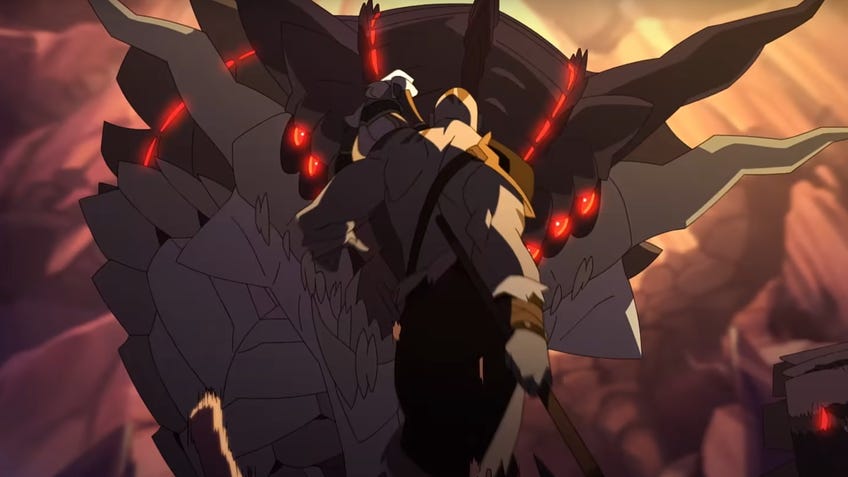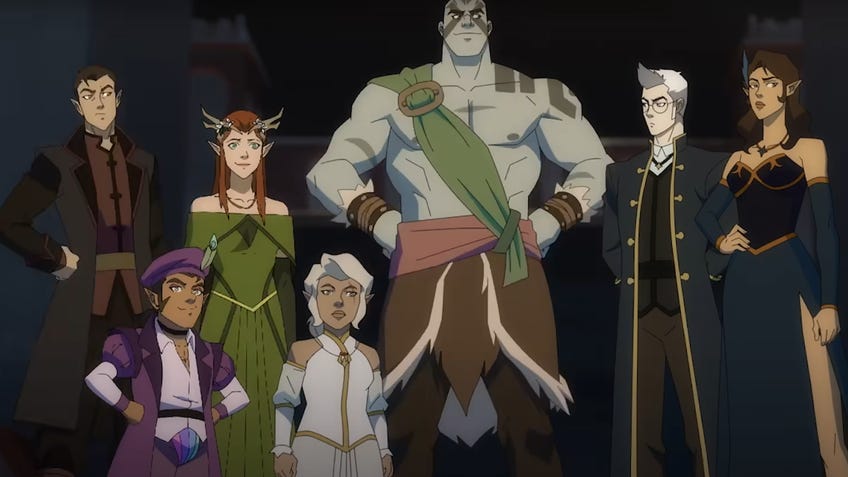The Legend of Vox Machina is a poor substitute for the original Critical Role
Not exactly animated.
I didn’t back the Kickstarter campaign for The Legend of Vox Machina, an animated series which makes its debut on Amazon Prime this week. This isn’t because I didn’t like Critical Role – the Dungeons & Dragons actual play show it’s based on. On the contrary, it’s because I loved it. I may have cooled on Critical Role in recently, but I still have a deep affection for its very first campaign, which serves as the foundation for The Legend of Vox Machina, and didn’t believe that an animated series would be a good fit. Having just finished watching the first half of the first season, I still believe this.
For the uninitiated, Critical Role is a series in which a group of voice actors – comprised of some pretty big names such as Ashley Johnson (The Last of Us), the Video Game BAFTA-winning Laura Bailey (The Last of Us II) and dungeon master Matthew Mercer (Overwatch) - play D&D together and stream it live on Twitch. It’s come a long way since Campaign One, hence the animated series on Amazon Prime, but at its core it’s still a show about playing an RPG – which is inevitably lost when it’s translated into a television series.
I don’t remember Campaign One reveling in its cruder aspects nearly this much.
The Legend of Vox Machina focuses on the antics of Vex, Vax, Grog, Scanlan, Pike, Keyleth and Percy, a band of mercenaries for hire who find themselves quickly wrapped up in matters much larger than they were prepared for. Taking place in a world created by Mercer, the animated series begins in an incredibly bizarre fashion that I really wasn’t prepared for. After a party of unfortunate heroes is violently slain – and I mean REALLY violently – the series quickly jumps to our protagonists getting drunk at a tavern, before a classic bar-fight erupts inside. Cue, in rapid succession, vomiting jokes, explicit nudity and sex, burp jokes, and profusive use of the word ‘fuck’. In fact, characters in LoVM say fuck with all the gusto of a 12-year-old who’s just discovered its existence.

There are burp jokes mixed in with dick jokes mixed in with all the extremely gratuitous violence. I’m certainly not playing the prude here; Castlevania is one of my favourite animated series and it’s filled to the brim with nudity and violence. The difference here is that I don’t remember Campaign One reveling in its cruder aspects nearly this much. It also helped that most jokes were often told in a fourth-wall breaking way where it felt more like your mates were sharing a giggle with you, rather than trying desperately to impress you with how rude they can be. At one point there’s a great reference to a running joke made in Campaign Two that just reminded me how actually funny Critical Role can be.
The show still feels like it’s rushing attempting to cram in the same character development and plotlines that took literally hours to tell.
Besides the odd fixation on crude humour and violence, it’s also the cause of a serious tone problem throughout all five episodes I watched. Whilst the tone of the original Campaign One can veer between stupid and serious, this happened over the course of sometimes five-hour-long sessions. In The Legend of Vox Machina’s 25-minute episodes, one minute you’ll be watching Scanlan make a sordid joke and the next a child will be murdered. How violence is used is incredibly off-putting, with characters sometimes being casually torn to shreds with barely a second glance, whilst the audience is expected to care about the pain or death of others. This particular dance between tones is really difficult to pull off at the best of times. Watching the original campaign, it was much easier to forgive weird humour instances like this because they would often be spontaneous outbursts from the cast. But here it feels like LoVM just doesn’t know how to pull it off in an animated series format.
Things do improve from episode three onwards, with fewer cringe-worthy jokes – though they’re certainly still there – and the portrayal of violence being a lot more tonally consistent. The storytelling also gets better from this point, with the series feeling like it’s on stronger ground with one of the major plotlines from Critical Role Campaign One. It does help that the plot begins to focus more on the characters, rather than wacky hijinks in fantasy land, with their interactions allowing for some good ol’ fashioned entertainment.
But the show still feels like it’s rushing, desperately attempting to cram in the same character development and plotlines that took literally hours and hours to tell. Critical Role sessions are incredibly long - in large part due to the fact that D&D combat takes an age to play - but also because the players would and do often take time to have their characters just sit around and talk, or go shopping, or even take a whole day in a bathtub together. This is something that makes the actual play show special and it’s something that an animated series just cannot do.

The result of this pacing problem isn’t just rushed plot elements and a lack of memorable moments to ruminate upon, it also makes it abundantly clear how straightforward the characters of Vox Machina are. I’ve always preferred The Mighty Nein over Vox Machina because they feel like better-realised characters, with the cast of Critical Role having gained experience from Campaign One and creating a group of complicated but sympathetic individuals.
LoVM’s decision to remain faithful to its characters and plotlines hampers the show’s ability.
Strip away all the actual play elements that made Critical Role Campaign One unique and you’re left with a party of class archetypes. Scanlan is the charismatic bard, Grog is the aggressive barbarian, Vax is the sneaky rogue – I could go on. Whilst these basic character types worked in Critical Role Campaign One – and even got some development later on – they suffer in The Legend of Vox Machina. There are moments of good character interaction between Vox Machina, especially when the series leans more into drama instead of comedy, but for the most part it feels pretty rudimentary when it comes to character development in a television series.

Last year saw the release of Arcane on Netflix, an animated series very loosely based on the video game League of Legends. Despite not being a fan of LoL and knowing absolutely nothing about its world or characters, I was gripped by Arcane thanks to its incredibly creative art style, themes of political injustice and complex characters. Obviously, it would be unfair to compare Arcane and The Legend of Vox Machina when it comes to animation budget – and I actually don’t mind LoVM’s art style – but I can compare how both approached the matter of adaptation. The key is that Arcane didn’t have much of a plotline to borrow from LoL, so it seemed to mostly take characters and world-building elements from its original source, which allowed it to create something that felt designed for television. LoVM’s decision to remain faithful to its characters and plotlines hampers the show’s ability to compete with other animated series that do what it attempts to do – tell an epic story about a group of mix-matched characters who need to grow – much better, because it’s using elements devised within an actual play show.
By creating something apart from its remarkable original format, but not different enough, The Legend of Vox Machina ends up being completely unremarkable.


